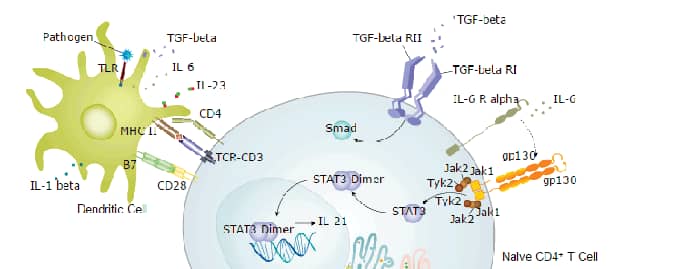Mouse CD28 Antibody Summary
Lys21-Lys149
Accession # P31041
Applications
Please Note: Optimal dilutions should be determined by each laboratory for each application. General Protocols are available in the Technical Information section on our website.
Reconstitution Calculator
Preparation and Storage
- 12 months from date of receipt, -20 to -70 °C as supplied.
- 1 month, 2 to 8 °C under sterile conditions after reconstitution.
- 6 months, -20 to -70 °C under sterile conditions after reconstitution.
Background: CD28
CD28 and CTLA-4, together with their ligands B7-1 and B7-2, constitute one of the dominant costimulatory pathways that regulate T and B cell responses. CD28 and CTLA-4 are structurally homologous molecules that are members of the immunoglobulin (Ig) gene superfamily. Both CD28 and CTLA-4 are composed of a single Ig V‑like extracellular domain, a transmembrane domain and an intracellular domain. CD28 and CTLA-4 are both expressed on the cell surface as disulfide-linked homodimers or as monomers. The genes encoding these two molecules are closely linked on human chromosome 2 and mouse chromosome 1. Mouse CD28 is expressed constitutively on virtually 100% of mouse T cells and on developing thymocytes. Cell surface expression of mouse CD28 is down-regulated upon ligation of CD28 in the presence of PMA or PHA. In contrast, CTLA-4 is not expressed constitutively but is upregulated rapidly following T cell activation and CD28 ligation. Cell surface expression of CTLA-4 peaks approximately 48 hours after activation. Although both CTLA-4 and CD28 can bind to the same ligands, CTLA-4 binds to B7‑1 and B7‑2 with a 20-100 fold higher affinity than CD28. CD28/B7 interaction has been shown to prevent apoptosis of activated T cells via the up‑regulation of Bcl‑xL. CD28 ligation has also been shown to regulate Th1/Th2 differentiation. Agonist activity has been reported using MAB4831 (4,5).
- Lenschow, D.J. et al. (1996) Annu. Rev. Immunol. 14:233.
- Hathcock, K.S. and R.J. Hodes (1996) Advances in Immunol. 62:131.
- Ward, S.G. (1996) Biochem. J. 318:361.
- Nguyen, P. et al. (2003) Blood 13:4320.
- Orbach, A. et al. (2007) J. Immunol. 179:7287.
Product Datasheets
Citations for Mouse CD28 Antibody
R&D Systems personnel manually curate a database that contains references using R&D Systems products. The data collected includes not only links to publications in PubMed, but also provides information about sample types, species, and experimental conditions.
4
Citations: Showing 1 - 4
Filter your results:
Filter by:
-
T cells specific for post-translational modifications escape intrathymic tolerance induction
Authors: B Raposo, P Merky, C Lundqvist, H Yamada, V Urbonavici, C Niaudet, J Viljanen, J Kihlberg, B Kyewski, O Ekwall, R Holmdahl, J Bäcklund
Nat Commun, 2018-01-24;9(1):353.
Species: Mouse
Sample Types: Whole Cells
Applications: Functional Assay -
Transcriptional regulator CTR9 inhibits Th17 differentiation via repression of IL-17 expression.
Authors: Yoo, Hyeon-Se, Choi, Yongwook, Ahn, Narae, Lee, Saseong, Kim, Wan-Uk, Jang, Min Seon, Jang, Myoung H, Kim, Yon Su, Yoo, Joo-Yeon
J Immunol, 2014-01-13;192(4):1440-8.
Species: Mouse
Sample Types: Whole Cells
Applications: Functional Assay -
CD73 expression on extracellular vesicles derived from CD4+ CD25+ Foxp3+ T cells contributes to their regulatory function.
Authors: Smyth L, Ratnasothy K, Tsang J, Boardman D, Warley A, Lechler R, Lombardi G
Eur J Immunol, 2013-07-15;43(9):2430-40.
Species: Mouse
Sample Types: Whole Cells
Applications: Functional Assay -
Identification of a murine CD28 dileucine motif that suppresses single-chain chimeric T-cell receptor expression and function.
Authors: Nguyen P, Moisini I, Geiger TL
Blood, 2003-08-28;102(13):4320-5.
Applications: Functional Assay
FAQs
No product specific FAQs exist for this product, however you may
View all Antibody FAQsReviews for Mouse CD28 Antibody
There are currently no reviews for this product. Be the first to review Mouse CD28 Antibody and earn rewards!
Have you used Mouse CD28 Antibody?
Submit a review and receive an Amazon gift card.
$25/€18/£15/$25CAN/¥75 Yuan/¥2500 Yen for a review with an image
$10/€7/£6/$10 CAD/¥70 Yuan/¥1110 Yen for a review without an image





